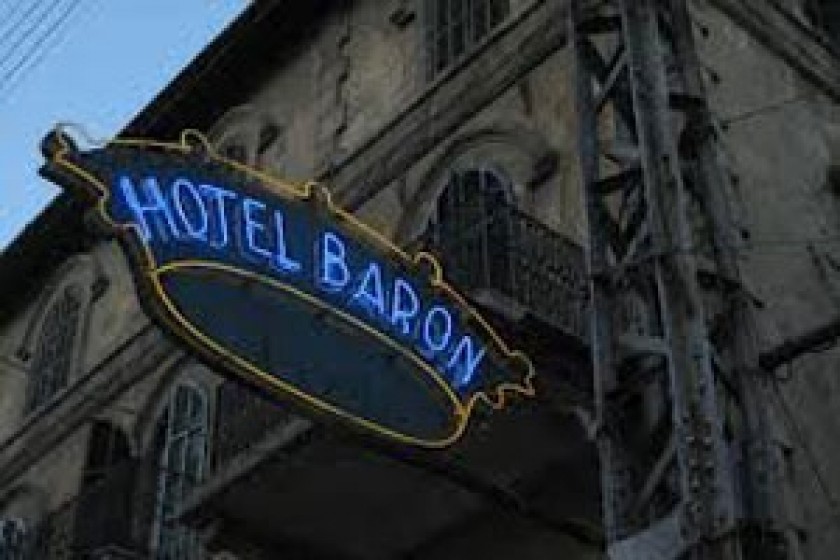
The Forgotten of Aleppo’s Hotel Baron
By Flavia Amabile
‘Madame Flavia, Syria is finished, Aleppo is finished’. Armen Mazloumian pauses, maybe following a flashing thought. An ominous silence’s spreading all around: in Aleppo Baron Street has always been a busy road, crowded and jammed night and day, in the very heart of Aleppo, a five minute walk from the suq. Today it is a still street, totally mute but for the frequent clashes in the surroundings and for the noise of the loyalist troops headquartered nearby to protect the area.
The Baron’s Hotel stands there, in the middle of the street as it does since 1911, when it opened its doors. Founded by Armen Mazloumian, the grandfather of the present owner, it gave its name to the street, a tribute and a homage since everyone knows it: Barons’ history mirrors Syria’s history. And everyone looks at the future of the hotel to understand the future of the country. It was a place of culture and power when Syria was a place of culture and power. T.H. Lawrence would have never slept anywhere else when he came back from his tours officially devoted to archaeological sites, actually following his role as intelligence officer and military adviser in the Middle East. The souvenirs of his stay at Baron’s lie in the hall on the right just after the entrance: sheets of paper of a wrong bill, letters, and pictures. Now the hall is closed, windows glasses were broken one week ago by the last grenade that went off in the street. It’s almost two years since when someone nosed around the precious showcase to look at the tiny calligraphy of the Englishman that wanted to lead the Arab revolt.
The opposite door opens on the Baron’s bar, a kind of a tale among travelers in the past. Everyone stopped and astonished at its amazing British countryside furniture. No one ever saw anything of the kind in the very heart of Middle East.
Sunk in the armchair in the right corner Agatha Christie wrote “Murder on The Orient-Express” during the 30s. In the following years people came from every corner of the world to grip that peculiar touch of the room. Today the most famous lounge hall among travelers and archaeologists of last century is closed, barred, and its windows blown to pieces too. ‘No one has ever tried to attack us – Armen Mazloumian tells – loyalist troops defend the street’. But who will protect them from bomb blasts? ‘Half of Alep fled to escape the fighting, the suq was pillaged and sacked, the Citadel damaged’. Who had the chance fled months ago when borders were open and streets safe. Armen remained. The hotel leans entirely on his shoulder. Koko, his father, the man that turned the Baron’s into one of the most charming hotels in Middle East, passed away. Sally, his mother, is a 92 years old lady , mostly spent reaching for a dream never come true. In 1945 she was a young, beautiful fleeing to leave London bombs behind. She was looking for a free and safe land and happened in Alep where she hoped to begin a new life, unaware that she’d meet again the nightmare from which she was running away 60 years before.
It’s not easy to live these days in this sad town, once one of the main center of trades on the Silk Road. Sally doesn’t get out since long. Armen is an aging man, some serious diseases affect him and his medicines stock is running out. He too doesn’t go out, his legs can’t run anymore and flee to safety in case of bombings. A young boy helps him wandering in quest for food in the few stores still open. Armen can hardly go upstairs, to the first floor.
The most imposing rooms are located there, the ones furnished with the fine hand-woven carpets collected by his grandfather in the beginning of XX century. Those are the rooms where guests such as Charles De Gaulle and Rockefeller slept. And the rooms where thousands of Armenians were saved in those years during the genocide committed by the Young Turks. And where were kept important documents definitely supporting the historical reconstruction of the Armenian genocide. For more than a century Middle East history has been parading on the Baron Hotel’s terrace and its fate depicted Syria’s destiny.
In the next future Armen most urgent worry is to find some wooden planks to protect the hotel’s windows from grenades that will surely blast or where to find fuel to face the coming winter. This is Baron’s destiny now, served with the unpleasant feeling that this could be the last chapter of Baron’s and Syria book. «Madame Flavia, it’s all finished», he repeats and the same unsetting silence spreads again all around.
(La STAMPA, October 25, 2012)
 Videos
Videos Photos
Photos
Comments (18)
Write a comment